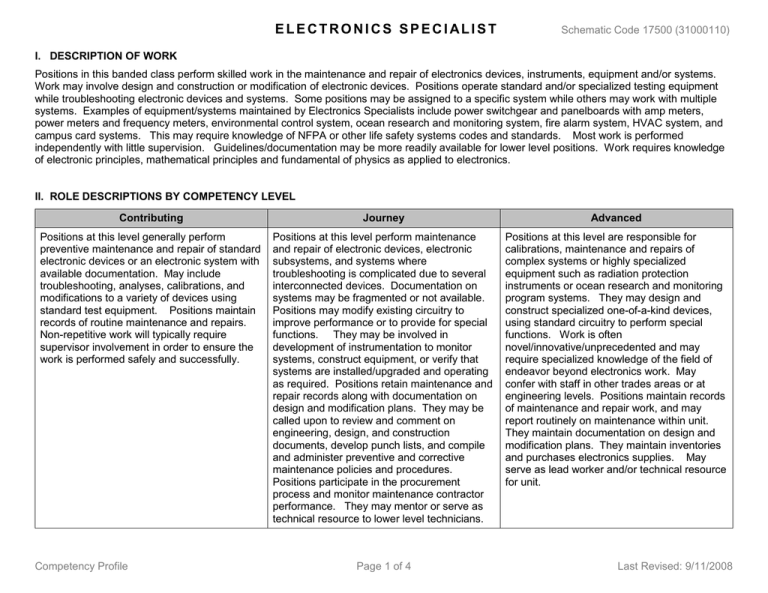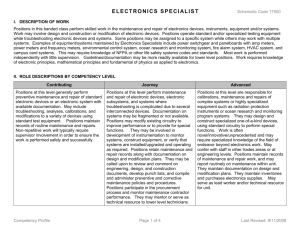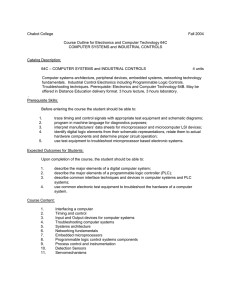electronics specialist
advertisement

ELECTRONICS SPECIALIST Schematic Code 17500 (31000110) I. DESCRIPTION OF WORK Positions in this banded class perform skilled work in the maintenance and repair of electronics devices, instruments, equipment and/or systems. Work may involve design and construction or modification of electronic devices. Positions operate standard and/or specialized testing equipment while troubleshooting electronic devices and systems. Some positions may be assigned to a specific system while others may work with multiple systems. Examples of equipment/systems maintained by Electronics Specialists include power switchgear and panelboards with amp meters, power meters and frequency meters, environmental control system, ocean research and monitoring system, fire alarm system, HVAC system, and campus card systems. This may require knowledge of NFPA or other life safety systems codes and standards. Most work is performed independently with little supervision. Guidelines/documentation may be more readily available for lower level positions. Work requires knowledge of electronic principles, mathematical principles and fundamental of physics as applied to electronics. II. ROLE DESCRIPTIONS BY COMPETENCY LEVEL Contributing Journey Advanced Positions at this level generally perform preventive maintenance and repair of standard electronic devices or an electronic system with available documentation. May include troubleshooting, analyses, calibrations, and modifications to a variety of devices using standard test equipment. Positions maintain records of routine maintenance and repairs. Non-repetitive work will typically require supervisor involvement in order to ensure the work is performed safely and successfully. Positions at this level perform maintenance and repair of electronic devices, electronic subsystems, and systems where troubleshooting is complicated due to several interconnected devices. Documentation on systems may be fragmented or not available. Positions may modify existing circuitry to improve performance or to provide for special functions. They may be involved in development of instrumentation to monitor systems, construct equipment, or verify that systems are installed/upgraded and operating as required. Positions retain maintenance and repair records along with documentation on design and modification plans. They may be called upon to review and comment on engineering, design, and construction documents, develop punch lists, and compile and administer preventive and corrective maintenance policies and procedures. Positions participate in the procurement process and monitor maintenance contractor performance. They may mentor or serve as technical resource to lower level technicians. Positions at this level are responsible for calibrations, maintenance and repairs of complex systems or highly specialized equipment such as radiation protection instruments or ocean research and monitoring program systems. They may design and construct specialized one-of-a-kind devices, using standard circuitry to perform special functions. Work is often novel/innovative/unprecedented and may require specialized knowledge of the field of endeavor beyond electronics work. May confer with staff in other trades areas or at engineering levels. Positions maintain records of maintenance and repair work, and may report routinely on maintenance within unit. They maintain documentation on design and modification plans. They maintain inventories and purchases electronics supplies. May serve as lead worker and/or technical resource for unit. Competency Profile Page 1 of 4 Last Revised: 9/11/2008 Electronic Specialist • Schematic Code 17500 (31000110) III. COMPETENCIES Competency Definition Knowledge - Technical Possession of a designated level of technical skill or knowledge in a specific technical area(s) and the ability to keep up with current developments and trends in areas of expertise. May be acquired through academic, apprenticeship or on-the-job training or a combination of these. Problem Solving Ability to identify problems, determine possible solutions, and actively work to resolve the issues. Safety and Health Compliance Ability to demonstrate an understanding of applicable policies and procedures. Ability to maintain conditions that ensure a healthy and safe working environment. Note: Not all competencies apply to every position/employee; evaluate only those that apply. Competency statements are progressive. IV. COMPETENCY STATEMENTS BY LEVEL Knowledge – Technical Possession of a designated level of technical skill or knowledge in a specific technical area(s) and the ability to keep up with current developments and trends in areas of expertise. May be acquired through academic, apprenticeship or on-the-job training or a combination of these. Contributing Journey Advanced Ability to perform a limited variety of recurring and related tasks/functions using basic knowledge of electronic principles and use of standard tools and test equipment. Ability to read and understand schematic and wiring diagrams and maintenance manuals. Ability to systematically troubleshoot standard electronic devices or systems. Ability to perform a variety of recurring and non-recurring tasks/functions using a working knowledge of electronic principles and use of non-standard tools and specialized test equipment. Ability to modify standard circuitry to improve its performance or to perform special effects. Ability to troubleshoot nonstandard electronic devices or devices for which documentation is incomplete or not available. Ability to represent the organization in modification and capital project engineering, design, and construction. Ability to routinely and consistently perform diverse and complex tasks using considerable knowledge of electronic principles. Tasks require in-depth analysis. May require ability to modify and/or design electronic circuits or hardware to complete assignment. Ability to develop innovative electronics troubleshooting and testing procedures. Ability to read and comprehend periodicals on electronics advances and apply new theories and components to design projects. Ability to provide consultation services to clients regarding equipment purchases. Competency Profile Page 2 of 4 Last Revised: 9/11/2008 Electronic Specialist • Schematic Code 17500 (31000110) Problem Solving Ability to identify problems, determine possible solutions, and actively work to resolve the issues. Contributing Journey Ability to identify and resolve standard/routine problems with electronic devices, equipment, systems through routine inspection and preventive maintenance/testing, after system/equipment failure, or when updating equipment with new technologies. Ability to operate standard test equipment to troubleshoot and repair electronic devices or systems that are well documented with wiring and schematic diagrams and factory maintenance manuals. Ability to resolve problems with hardware and software. Ability to identify (and may require ability to resolve or make recommendations for) nonstandard/more complex problems with electronic devices, electronic subsystems and systems through inspection and maintenance, or after system/equipment installation/failure. Ability to troubleshoot and evaluate options; ability to choose appropriate action by considering potential outcomes. Ability to operate specialized test equipment to troubleshoot and repair non-standard electronic devices and systems. Ability to research electronic literature to modify, build, or interface electronic devices. Competency Profile Page 3 of 4 Advanced Ability to anticipate and proactively pursue maintenance issues. Ability to confer with supervisor or client to determine purpose of requested device and operating parameters before designing and constructing device or before diagramming and designing circuits to perform unique, unusual functions. Ability to identify problems with complex systems or electronic instrumentation through preventive and corrective maintenance, with design and implementation/ installation of instruments or through cooperative work with personnel of other programs. Ability to determine circuit configuration and function of complex electronics systems in absence of documentation. Last Revised: 9/11/2008 Electronic Specialist • Schematic Code 17500 (31000110) Safety and Health Compliance Ability to demonstrate an understanding of applicable policies and procedures. Ability to maintain conditions that ensure a healthy and safe working environment. Contributing Journey Advanced Ability to perform tasks and duties safely to avoid danger to self and others. Ability to follow applicable regulations, codes, policies and procedures. Ability to identify and inform supervisor of potential safety problems. Ability to warn others of potential hazards. Ability to use appropriate protective equipment following established protocols. Ability to incorporate accident prevention and corrective measures in work related activities. Ability to follow appropriate post-emergency procedures. Ability to anticipate, identify, and resolve potential safety problems and unsafe work practices in assigned area. Ability to demonstrate to employees and others, safe ways to perform job tasks or the use of equipment. Ability to inform supervisor of unusual safety concerns and make recommendations for resolution using applicable codes and regulations. Ability to determine appropriate protective equipment based on established standards. Ability to regularly assess site and shop operations for safety. May require ability to interact with vendors and contractors to verify proper installation and operation to ensure safety of faculty and general public. Ability to regularly assess safety conditions; ability to identify, communicate, and implement accident prevention and corrective measures in work related activities. Ability to apply applicable regulations, codes to enhance work unit processes and procedures. May require ability to train others in proper and safe use of equipment. Ability to anticipate departmental safety issues and take proactive steps to maximize safe operations and measure the effectiveness of action. V. MINIMUM TRAINING & EXPERIENCE Associate’s degree in electronics; or equivalent combination of training and experience. All degrees must be received from appropriately accredited institutions. Note: This is a generalized representation of positions in this class and is not intended to identify essential work functions per ADA. Examples of competencies are primarily those of the majority of positions in this class, but may not be applicable to all positions. Competency Profile Page 4 of 4 Last Revised: 9/11/2008




